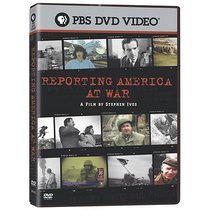| Actor: Linda Hunt Director: Stephen Ives Creators: Alan Palmer, Allen Moore, Buddy Squires, Gary Grieg, Gary Steele, Peter Nelson, Terry Hopkins, Stephen Ives, George O'Donnell, Juliana Parroni, Toby Shimin, Abby S. Whitlow, Amanda Pollak, Cornelia Calder, Dalton Delan, David S. Thompson, Robert A. Wilson, Michelle Ferrari Genres: Television, Documentary Sub-Genres: Television, Documentary Studio: Pbs (Direct) Format: DVD - Color DVD Release Date: 11/04/2003 Original Release Date: 11/05/2003 Theatrical Release Date: 11/05/2003 Release Year: 2003 Run Time: 3hr 0min Screens: Color Number of Discs: 1 SwapaDVD Credits: 1 Total Copies: 0 Members Wishing: 0 MPAA Rating: NR (Not Rated) Languages: English |
Search - Reporting America at War on DVD
  | Reporting America at War Actor: Linda Hunt Director: Stephen Ives Genres: Television, Documentary NR 2003 3hr 0min |
Larger Image |
Movie Details
We're sorry, our database doesn't have DVD description information for this item. Click here to check Amazon's database -- you can return to this page by closing the new browser tab/window if you want to obtain the DVD from SwapaDVD.
Click here to submit a DVD description for approval.
Similar Movies
|
Movie ReviewsAn intimate portrait of combat journalism Kyle Tolle | Phoenix, Arizona USA | 07/08/2007 (5 out of 5 stars) "Broken up into two segments and comprising about 3 hours of material, `Reporting America at War' is a detailed and comprehensive look at the history of media coverage in wartime environments during the 20th century.
Episode One: The Romance of War Starting with the Spanish-American war and then moving into World Wars one and two, a historical perspective is shown how war correspondents developed a relationship with the military and were able to report information from the front lines. When preparing stories, official censors often reviewed newsreels, radio broadcasts, and written stories from the battle areas in an attempt to determine what might be best for public consumption. Sometimes journalists had to perform a juggling act in determining their efforts to report as objectively as possible, not to choose sides in a conflict, avoiding exploitative material, and being cautious as not to reveal confidential information important to American interests. Nearing the end of World War 2, it was a profound time for news coverage as correspondents arrived at the Bergen-Belsen, Dachau, and Buchenwald concentration camps and the pictures and stories that were released from here shocked the world. Episode Two: Which Side Are You On? In looking at America's next conflict and the beginning of the cold war, Korea presented a new situation in war reporting. Not confined to censorship policies and given only voluntary guidelines to follow by the military, journalists now took a more unreserved approach to reporting the combat news. America was now getting the bitter truth about the questionable efforts in Korea and all the devastation that was emanating from it. This caused the military to become dispirited with the media and a rift began to form between them that would carry on for many years. As for Vietnam, there was no censorship here either but it was hard for journalists to report objectively as American officials were reluctant to talk about our presence there. Several months into the conflict in Vietnam, reporters eventually began to receive dubious information about the American involvement in the country. The military's idea of releasing anything newsworthy was to often embellish the facts about progress being made, omit information altogether, or maybe even fabricate different things. In the mid-1960's, reporting from Vietnam finally became televised on a fairly regular basis and this opened up new perspectives on this unpopular and ugly conflict. In late 1967, public opinion about Vietnam began to splinter. The war correspondents messages were coming across loud and clear. The American public began to question the objectives and strategies toward foreign countries and they were openly harboring doubts about war of any kind. Any relationship left between the military and the media was now eroding faster than ever. In conflicts following Vietnam (such as Grenada), the government denied correspondents the opportunity to report from the front lines but they finally had to compromise. The new plan was to select a group of journalists known as `pools' and they were the ones that would link up with certain units and report the stories. The military exercised strict control over the conduct and movement of the reporters during their coverage of the Persian Gulf War in 1991. Finally, reverting back to methods used in World War 2, the military once again allowed the correspondents to be `embedded' into the fighting units in 2003 in Iraq so they could report from the war front. `Reporting America at War', in my opinion, is a fascinating and educational look at wartime journalism and how it has evolved through the years. Combining solid narration, great historical war footage, and expert commentary from military scholars, historians, and famous war correspondents, this PBS documentary is a well crafted feature from beginning to end and I recommend it to everyone. " |



